In a significant development for mental health and geriatric care in Nigeria, Anambra State witnessed the official commissioning of the Seraphic Psychiatric Hospital and Old People’s Home, a state-of-the-art facility situated in Aguleri, within the Anambra East Local Government Area. The project, which boasts over 400 beds and the capacity to accommodate nearly 500 people, was spearheaded by the Seraphic Foundation—the charity arm of Zion Prayer Movement Outreach—under the leadership of Evangelist Ebuka Obi.
Governor Prof. Chukwuma Soludo presided over the inauguration ceremony, expressing deep admiration for Evangelist Obi and the vision behind the institution. According to Governor Soludo, the establishment aligns closely with his administration’s priorities around social welfare, particularly for the less privileged and vulnerable groups. He highlighted the broader significance of such initiatives, stating, “While many in ministry have commercialised faith, Evangelist Obi reminds us that genuine service to society is the true essence of Christianity.”
The governor reportedly pledged a sustained partnership between the state government and the hospital, promising critical infrastructural support to help the facility thrive. This is said to include the provision of a new electrical transformer and the construction of an accessible road leading directly to the hospital compound. “This is what government should be doing, but we know that collaboration is necessary,” Soludo was quoted as saying. “We are determined to support this noble cause, not just in words but in real action every month.”
The governor emphasized the importance of translating religious values into tangible societal impact, challenging local faith communities to follow suit: “Evangelist Obi is posing a question to Christians and all people of goodwill: Who are you able to support or lift? There is no better time for giving than now—let’s live out our faith in the most practical ways.”
Evangelist Obi, the spiritual director of Zion Prayer Movement Outreach, used the opportunity to clarify that the event was not a political gathering. He thanked the state for its hospitality, specifically mentioning the warm reception he received at the “Light House” in Awka—an emerging administrative and spiritual hub in the state capital.
“This psychiatric hospital and old people’s home mark the realisation of my childhood vision,” Obi shared with attendees. “Too often we turn a blind eye to those suffering on our streets, especially the mentally unwell and elderly. I have visited many countries, yet it’s rare to see homeless mentally challenged people in public places the way we do here. We want to change that narrative in Anambra and, hopefully, across Nigeria and West Africa.”
Notably, Obi asserted that the facility would provide free medical care to those in need, underscoring a recurring challenge across Nigeria and many African nations where mental health remains stigmatised and geriatric care is often lacking. He noted that similar projects have already been completed in neighbouring states, with plans underway to expand the model nationwide.
“The goal is to offer mental health care to the indigent while also ensuring dignity and security for our senior citizens—all at zero cost to them,” Obi explained. He reiterated that politics had no part to play in the event, despite reported requests from various governorship candidates to speak at the ceremony. “We are not a political outfit; our focus is solely on service to humanity.”
During the event, Evangelist Obi also took the audience through the modern amenities within the complex, emphasizing the accelerated timeline of the project and the intention to commence full-scale operations within a month. “The hospital is fully equipped; anytime we see someone struggling with mental health in the streets, we will bring them here for proper treatment,” he affirmed.
Local health professionals and community leaders present at the event hailed the opening of the facility as “long overdue” and “a major step toward bridging the mental health treatment gap in Southeast Nigeria.” According to Dr. Nkiru Eke, a public health consultant based in Onitsha, “Less than 10% of Nigerians with severe mental illness receive appropriate care nationwide, often due to a mix of stigma, inadequate facilities, and poor funding. This new hospital, if properly resourced, could serve as a template for grassroots-led mental health reform in the country.”
Elderly care remains another under-addressed need in Nigeria, where families often bear sole responsibility for ageing relatives, and social safety nets are limited. Mrs. Nneka Onwukwe, a community leader from Aguleri, observed, “So many elderly people here have nowhere to go when their families can no longer cope. This facility brings hope that our seniors can live out their years with dignity and support.”
Mental health advocates in Ghana, Liberia, and other West African countries have watched Nigeria’s evolving approach to psychiatric care with keen interest. While reputable government-run institutions exist, they often struggle with chronic underfunding and rising demand. According to World Health Organization data, the mental health workforce deficit across Sub-Saharan Africa remains among the highest globally, making private and charitable initiatives like this vital.
Comparatively, partnerships involving both government and faith-based organizations are emerging as powerful catalysts for health system improvement across the continent. “For too long, mental health has been left behind in Africa’s health discourse,” said Dr. Nana Mensah, a psychiatrist in Accra, Ghana. “Nigeria’s new facility—and the state’s commitment to supporting it—could offer other countries a model to emulate, provided the approach remains inclusive and sustainable.”
The ceremony drew a large crowd, including supporters of Zion Ministry from all across the country, as well as representatives of local health NGOs and government agencies. By integrating the project into the broader social welfare framework, stakeholders hope it can address multi-layered challenges—offering not just shelter and healthcare, but social reintegration and family support for those in need.
As operations ramp up over the coming months, observers will watch closely to assess long-term outcomes and the effectiveness of the government’s promised support. Key issues will include adequate staffing, ongoing power supply, community involvement, and the development of a referral network to ensure seamless access for those in need.
With critics noting persistent gaps in nationwide health policy implementation and funding, the coming years will show whether the Seraphic Psychiatric Hospital and Old People’s Home can become a beacon of hope—not just for Anambra, but for the broader West African region seeking practical solutions to mental health and geriatric care challenges.
How do you feel about this new psychiatric and old people’s facility in Anambra State? Do you think charitable partnerships are the answer to Nigeria’s mental health and elderly care challenges, or should government play a bigger role? Drop your thoughts in the comments below and follow us for more in-depth updates!
Got a news tip, health story, or opinion about community welfare in Nigeria or West Africa? Share your story with us! Email story@nowahalazone.com to get featured or discuss story submissions.
Need general support? Reach out at support@nowahalazone.com.
Stay connected with more news, interviews, and community stories—follow us on Facebook, X (Twitter), and Instagram!









